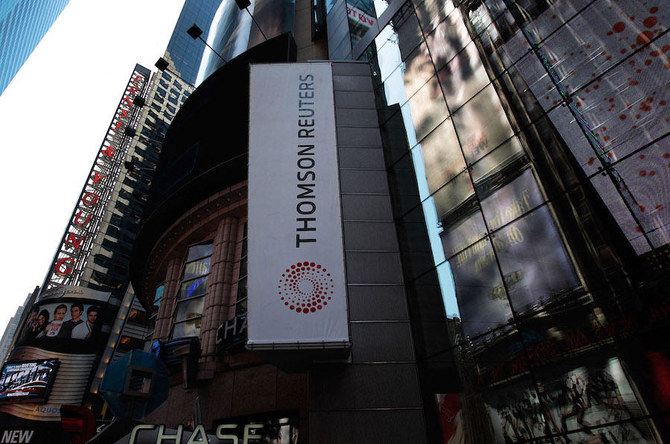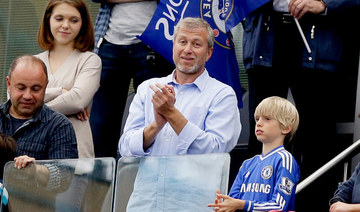LONDON: Reuters News has named one of its top editors, Alessandra Galloni, as its next editor-in-chief, the first woman to lead the globe-spanning news agency in its 170-year history.
A native of Rome, Galloni, 47, will replace Stephen J. Adler, who is retiring this month after leading the newsroom for the past decade. Under his leadership, Reuters has received hundreds of journalism awards, including seven Pulitzer Prizes, the industry’s highest honor.
A speaker of four languages, and with broad experience covering business and political news at Reuters and previously at the Wall Street Journal, Galloni takes the helm as the news agency faces an array of challenges. Some of these are common to all news media. Others are specific to the organization’s complexity: With a worldwide staff of some 2,450 journalists, Reuters serves a range of divergent customers and is also a unit in a much larger information-services business.
Since 2008, Reuters has been part of Thomson Reuters Corp. , a corporation with more-lucrative and faster-growing segments than news. Its chief executive, Steve Hasker, who joined Thomson Reuters last year, has focused on aggressively expanding the corporation’s three largest businesses: providing information, software and services to lawyers, corporations and the tax and accounting profession. Hasker’s strategy has helped boost Thomson Reuters stock to all-time highs.
Reuters News comprises about 10% of Thomson Reuters’ total $5.9 billion in revenues. Unlike many news organizations, Reuters is profitable. But it is also a drag on the parent company’s revenue growth and profit margin, analysts say, and the executive who runs the news business, Reuters President Michael Friedenberg, is pushing to increase sales and boost profitability. Looking forward, Thomson Reuters’ chief financial officer last month forecast that sales at its “Big Three” businesses are expected to grow 6% to 7% in 2023, while its news division and printing business “are expected to dilute organic revenue growth by about 1% to 2%.”
Gary Bisbee, an analyst at Bank of America, said he expects Reuters News “will continue to be a drag on the growth of the company,” but added that as other divisions of Thomson Reuters grow faster, that drag would diminish over time.
Thomson Reuters is hoping for a turn-around in the Reuters Events business, which it acquired in October 2019. Almost all in-person conferences last year were canceled or postponed because of the COVID-19 pandemic. But the business has pivoted to a hybrid events strategy for 2021 with both in-person and virtual conferences, and expects its revenues to improve.
While some in the industry have speculated that Thomson Reuters might want to sell the news division, three analysts said they don’t expect a sale. Douglas McCabe, a media analyst with Enders Analysis in London, said Reuters is “a tremendously powerful part of” the Thomson Reuters brand, and that “the mighty Reuters newsroom behind you and all the really specialized business assets is a great combination.”
In a statement, CEO Hasker said: “Thomson Reuters is committed to the future of Reuters News. It is an important part of the company and is valued across our customer base. The last year has proven beyond question the value of independent, global, unbiased journalism.”
This year saw the closing of a deal in which the former Financial and Risk business of Thomson Reuters — now called Refinitiv — was sold to the London Stock Exchange Group Plc in a $27 billion all-stock deal. Under the terms, Reuters News is guaranteed annual payments of at least $336 million to provide news and editorial content to Refinitiv until 2048. That stream of revenue is envied by many in the media industry.
Galloni has told colleagues that one of her critical tasks would be maintaining a good relationship with Refinitiv, as it is Reuters’ biggest customer, accounting for slightly more than half of the news agency’s $628 million in revenues last year.
The important relationship has been a source of some tension, senior editors say. As part of the contract with Refinitiv, Reuters is required to meet strict performance targets for the news coverage that Refinitiv clients receive, which Reuters has exceeded so far. Thomson Reuters, for its part, noted in its latest annual report that the exclusive deal, while lucrative, limits Reuters’ ability to sell to other customers in the growing financial-services industry. A Refinitiv spokesman declined to comment.
Gordon Crovitz, a former publisher of the Wall Street Journal, said the new editor will nevertheless have to find new sources of revenue. “Reuters is in an unusual position because the pledge from Refinitiv frees Reuters News up to be more aggressive in creating new news products to serve new markets,” he said. “I think there’s still a lot of low-hanging fruit for Reuters because of the strength of the brand and the size of the staff.”
New website
Reuters’ primary competitors include Bloomberg News, the Associated Press, French news agency AFP and visual content provider Getty Images. In addition to its events business, Reuters has been seeking other growth opportunities. Prominent among these is the upcoming launch of a revamped website that is expected to target professionals and eventually begin charging for content.
McCabe said convincing consumers to pay for content is challenging because “Reuters is a brand that a lot of people recognize but don’t intuitively go to.” But he is more optimistic that targeting professionals could succeed for Reuters. “All the evidence says to me that these are the subscription models that really work,” he said.
CEO Hasker has told colleagues that he wants to make Reuters more integral to the company’s other divisions. To that end, the newsroom recently added to its legal reporting staff.
Adler spearheaded a number of moves to modernize Reuters, which gained fame in its early days for using carrier pigeons to relay scoops. In the past decade, the newsroom created teams of investigative, data and graphics journalists, and is using artificial intelligence to speed the delivery of certain breaking financial news.
Hasker has said he is eager to continue modernizing the newsroom by getting it to embrace new technologies more aggressively. He and Friedenberg considered a wide range of journalists to succeed Adler, both inside and outside the news agency, according to people familiar with the matter.
Among them were two top Reuters editors, Gina Chua and Simon Robinson. The external candidates included David Walmsley, editor in chief of Canada’s The Globe and Mail, and Kevin Delaney, former co-chief executive and editor-in-chief of Quartz Media Inc.
Galloni, based in London, is known internally as a charismatic presence with a keen interest in business news. She has told colleagues that her priorities would include boosting the Reuters digital and events businesses.
She takes the helm after serving as a global managing editor of Reuters, overseeing journalists in 200 locations around the world. At the beginning of her career, she worked at the Reuters Italian-language news service. She received degrees from Harvard University and the London School of Economics. She returned to Reuters in 2013 following about 13 years at The Wall Street Journal, where she specialized in economics and business coverage as a reporter and editor in London, Paris and Rome.
“For 170 years, Reuters has set the standard for independent, trusted and global reporting,” Galloni said in the Reuters announcement on her appointment, which takes effect on April 19. “It is an honor to lead a world-class newsroom full of talented, dedicated and inspiring journalists.”
The hunt for the new Reuters editor came as other major media are dealing with succession in the newsroom. Both the Washington Post, where executive editor Marty Baron retired in February, and the Los Angeles Times, where Norman Pearlstine stepped down as executive editor in December, are currently seeking their replacements.
Reuters names Alessandra Galloni as its next editor-in-chief
https://arab.news/2y7y6
Reuters names Alessandra Galloni as its next editor-in-chief

- A native of Rome, Galloni, 47, will replace Stephen J. Adler, who is retiring this month after leading the newsroom for the past decade
Dentsu opens sports practice in MENA with Riyadh HQ

DUBAI: International advertising group Dentsu has announced the launch of its dedicated sports practice, dentsu Sports International, in the Middle East and North Africa region.
The new practice, which focuses on sports marketing and analytics services, will be headquartered in Riyadh, Saudi Arabia, with additional offices in the UAE.
To provide end-to-end service to clients, the group brings together three dentsu businesses: dentsu Sports International Commercial, MKTG Sports + Entertainment and dentsu Sports Analytics.
Charlie Wylie, managing director for Europe, Middle East and Africa at dentsu Sports International, said: “dentsu Sports International will serve as a strategic sports and entertainment arm of dentsu in MENA, offering comprehensive solutions tailored to the needs of brands and rights holders.”
The company has appointed Olaf Borutz as vice president of commercial development, reporting to dentsu Sports International’s global chief commercial officer, Echo Li.
Borutz’s previous role as head of sports and events at law firm Al Tamimi & Company saw him advise clients on sports and events-related commercial matters, including government bodies, rights holders, agencies and players of the Saudi Pro League and Qatar Stars League.
“The appetite for sports marketing in the Kingdom is at an all-time high, with Saudi’s ambitions and investment in this space only expected to grow,” said Tarek Daouk, CEO, dentsu MENA.
A significant 62 percent of Saudi sports fans say that sport plays a bigger role in their lives than before, according to a new study conducted by dentsu Sports International.
The study also found that fans spend more time and money than their international counterparts on live events in the Kingdom, with Saudi fans attending an average of six events in person a year, more than the UK average of two events per year.
Saudi Arabia’s significant youth population is passionate about sports, with 68 percent of 18–24-year-old Saudis saying they find attending sports events more rewarding than other entertainment events.
The study also revealed that these younger consumers are the most likely to purchase premium tickets, spending 31 percent more a ticket than older fans.
Daouk said: “It’s an exciting time for sports in the region and we are thrilled to launch dentsu’s bespoke sports and entertainment offering.”
Tunisia remands journalists arrested over critical comments

- Broadcaster Borhen Bssais and political commentator Mourad Zeghidi were arrested Saturday under a decree criminalizing ‘spreading false information’ among other charges, spokesman Mohamed Zitouna said
TUNIS: A Tunisian court on Wednesday ordered two journalists to be held in remand until the completion of investigations into critical comments, a court spokesman said.
Broadcaster Borhen Bssais and political commentator Mourad Zeghidi were arrested Saturday under a decree criminalizing “spreading false information” among other charges, spokesman Mohamed Zitouna said.
Zeghidi is being investigated over social media statements last February and a post in support of Mohamed Boughalleb, another journalist and critic of President Kais Saied who has been detained separately.
Bssais was arrested on accusations of “having harmed President Kais Saied through radio broadcasts and statements” online between 2019 and 2022, according to his lawyer Nizar Ayed.
Their trial is set to begin on May 22, according to their lawyers.
Both media figures are prosecuted under a law ratified by Saied in September 2022.
The law punishes people with up to five years in prison for the use of social media to “produce, spread (or) disseminate ... false news” and “slander others, tarnish their reputation, financially or morally harm them.”
Journalists and opposition figures have said it has been used to stifle dissent.
Since the decree came into force, more than 60 journalists, lawyers and opposition figures have been prosecuted under it, according to the National Union of Tunisian Journalists.
The same night Bssais and Zeghidi were taken into police custody, masked police raided the Tunisian bar association and arrested lawyer Sonia Dahmani, also on the same law.
On Monday, another lawyer was forcibly arrested at the association’s headquarters.
The president of the bar, Hatem Meziou, on Tuesday called for an end to “the abuse of power” and “violence” targeting the lawyers.
The European Union also expressed concern over a string of arrests of civil society figures in Tunisia — the latest sign of a tightening clampdown on freedoms under Saied.
Nongovernmental organizations have decried a rollback of freedoms in Tunisia since Saied began ruling by decree after a sweeping power grab in 2021.
‘Blockout’ trend targets celebrities over Gaza silence

- Selena Gomez, Zendaya and Kim Kardashian are among the celebrities who have lost hundreds of thousands of followers
- Boycott campaign gained traction following Met Gala event last week in New York
LONDON: A new trend threatening to boycott celebrities over their refusal to speak out about the Gaza conflict is gaining momentum on social media.
Known as “Blockout 2024,” the movement has surged in popularity following the Met Gala last week.
As part of a solidarity campaign, social media users are calling for the blocking of accounts of celebrities who have remained silent on the humanitarian crisis in Gaza.
High-profile figures such as Taylor Swift, Justin Bieber, and Drake are among the hundreds of celebrities facing this “digital guillotine.”
A full list is circulating on social media, leading to a significant loss of followers on Instagram and other platforms.
Actress and singer Selena Gomez reportedly lost 1 million followers on Instagram and 100,000 on X, according to US-based social media analytics site Sonic Blue.
Fellow actress and singer Zendaya, reality TV star Kim Kardashian, and her sister Kylie Jenner have also seen hundreds of thousands of followers drop.
Pro-Palestinian activists have been pressuring celebrities for months to show more support for Gaza civilians. This growing discontent reached a tipping point last week when the Met Gala’s glitz and glamour coincided with Israel’s announcement of a military offensive in Rafah.
@ladyfromtheoutside #greenscreen #greenscreenvideo #digitine #digitalguillotine #haleyybaylee ♬ original sound - Meagan
The movement was sparked by a TikTok video from influencer Haley Kalil at the Met Gala on May 7, where she lip-synced to the phrase “Let them eat cake.”
This phrase, attributed to Queen Marie Antoinette, drew parallels to the French Revolution, symbolizing indifference to the suffering of the impoverished.
“It’s time for the people to conduct what I want to call a ‘digital guillotine.’ A ‘digitine,’ if you will,” said TikTok creator @ladyfromtheoutside, who kicked off the movement with her viral video.
“It’s time to block all the celebrities, influencers and wealthy socialites who are not using their resources to help those in dire need. We gave them their platforms. It’s time to take it back, take our views away, our likes, our comments, our money.”
According to Gaza authorities, at least 35,000 people, mostly women and children, have been killed in the Palestinian territory during the seven-month war, which has been widely condemned as failing to comply with international humanitarian law.
BBC investigation leads to arrest of one of world’s most notorious people smugglers

- Barzan Majeed, nicknamed ‘Scorpion,’ is caught in Iraqi Kurdistan days after release of BBC podcast series by journalists who tracked him down and interviewed him
- Senior local official confirms officials used information from the broadcaster’s investigation to help find fugitive believed to have helped smuggle thousands of people to UK
DUBAI: Kurdish security forces arrested Barzan Majeed, described as one of the world’s most notorious people smugglers, in Iraqi Kurdistan on Sunday morning.
Nicknamed “Scorpion,” the fugitive is believed to have been involved in smuggling an estimated 10,000 people across the English Channel to the UK. He was arrested days after the release of a BBC podcast series in which investigative journalists tracked him down to the city of Sulaymaniyah in Iraq and interviewed him there.
During the interview, Majeed said he had lost count of the number of people he helped to smuggle, adding: “Maybe a thousand, maybe 10,000. I don’t know, I didn’t count.”
He admitted that between 2016 and 2019 he was one of two people who helped run a people-smuggling operation in Belgium and France but denied he was the mastermind of the operation.
“A couple of people, when they get arrested, they say, ‘We’re working for him’ — they want to get less (of a) sentence,” he said.
Originally from Iraq, Majeed moved to the city of Nottingham, in England, in 2013 but was deported two years later. He had been on the run since failing to appear at a court in Belgium for a sentencing hearing in November 2022.
The UK’s National Crime Agency issued a warrant for his arrest that same year. The agency, which confirmed his arrest, said: “We are grateful to the BBC for highlighting his case and remain determined to do all we can to disrupt and dismantle the criminal networks involved in smuggling people to the UK, wherever they operate.”
A senior member of the Kurdistan Regional Government confirmed its officials had used information from the BBC investigation to locate and arrest Majeed.
Each year, thousands of people flee Iraq, including its Kurdistan Region, in the hope of finding a better life in the UK or other parts of Europe. In many cases, they pay people smugglers to transport them, but the routes and methods used by the smugglers are often dangerous and the migrants face harsh weather and potentially deadly travel conditions.
Germany deported 222 Iraqi citizens in the first three months of this year as part of an alleged agreement between Berlin and Baghdad to deport migrants who do not qualify to remain in Germany, media organization Rudaw, which is based in Iraqi Kurdistan, reported this week.
Saudi radio station MBC FM marks 30 years of broadcasting with special events

- Bosses say the celebrations honor the pioneering station’s enduring contributions to the media landscape in the Kingdom
- ‘MBC FM has captured the ears and hearts of millions of Saudis over 3 decades’ and ‘continues to lead the radio airwaves with the love and loyalty of listeners,’ says group’s chairperson
LONDON: As pioneering Saudi radio station MBC FM celebrates three decades of broadcasting in the Kingdom, it is marking the milestone with a series of events and initiatives at the MBC Group headquarters in Riyadh under the theme “30 and Still Going Strong.”
The celebrations, which began on May 12, honor the station’s enduring contributions to Saudi Arabia’s media landscape, bosses said. They include competitions, entertainment events and exclusive interviews with renowned artists and stars from across the Gulf region and the wider Arab world.
“Just as MBC FM has captured the ears and hearts of millions of Saudis over three decades, being the first commercial FM radio station in the Kingdom, the radio and music sector at MBC Group today continues to lead the radio airwaves with the love and loyalty of listeners,” said Walid Al-Ibrahim, the chairperson of MBC Group.
In addition to providing entertainment for listeners, the station has served as a launchpad for emerging talent, he added, as he highlighted its influence on local culture.
Ziad Hamza, general manager of the radio and music Sector at MBC Group, said the station remains committed to its ongoing evolution while also honoring its strong history and legacy. In particular he highlighted investments in infrastructure, diversity of content and audience engagement as the station adapted to changing tastes and preferences among listeners.
“We have worked on developing the infrastructure and creating a comprehensive modern environment for the radio sector … by investing in Saudi youth talents, including radio presenters, producers, programmers and technicians,” said Hamza.
“We have also launched the MoodMBC application, which includes MBC FM, Panorama FM and MBC Podcast, in addition to enhanced options for direct communication, as well as rich and diverse content catering to poetry lovers, music session enthusiasts, and current affairs followers.
“Our goal has always been to strike a balance between the tastes of listeners and the needs of advertisers, facilitating our clients’ access to various target audience segments around the clock.”





















